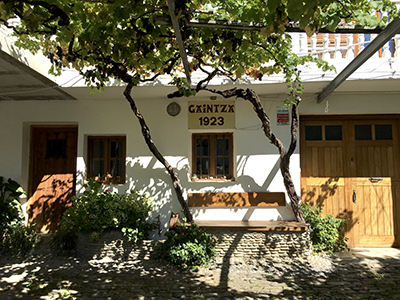
A classic name in Getaria (Gipuzkoa, Basque Country) and one of the founding producers of DO Getariako Txakolina in 1989, Gaintza stands in the district of San Prudencio next to the old family farmhouse or caserío built in 1923 by José Antonio Lazkano. His young great-grandsons, Joseba and Urtzi, who are in charge of management and vineyards respectively, are the fourth generation producing txakoli. They have taken the baton from their father Nicolás. Their mother Mariángeles still can be seen driving her van to deliver wine.
The Lazkanos are proud of their land, the landscape and their local traditions. Joseba enjoys telling visitors about the way local buyers used to visit txakoli producers, tasted the new vintage directly from the casks and wrote their names with chalk on the ones they would buy. This tradition, known as txotx, was also used to sell cider, another beverage deeply rooted in the region. There have been many other changes over the years. Alcohol used to be very low and grapes could go from being unripe to rot out quickly. “Now it rains just as much as it did in the past, but the drizzle that we call sirimiri is no longer seen as often; we have more days of sunshine and more sugar in our grapes,” Joseba points out.
Most of the vineyards are at walking distance from the winery. The family grows 23 hectares, most of them of their own and 80% of them are pergola-trained. Only three plots lie on the other side of Mount Gárate, and area less exposed to the saltpeter-laden sea breeze where grapes ripen easier. Their best land is four hectares of old ungrafted vines, half of which are over a hundred years old. The brothers are committed to sustainable viticulture (chemical products caused Urtzi to struggle with asthma) and would like to go organic, but the region’s climate combined with the fact that their plots are not isolated from those of other growers, make this move very challenging.
In terms of winemaking, indigenous yeasts are used unless they have to deal with difficult vintages. Fermentation takes place at low temperatures and all the wines are bottled at 0ºC in order to preserve the spritz.
Around 130,000 bottles are produced. Most of them correspond to the flagship Gaintza (€10), a blend of Hondarrabi Zuri and 10% of Izkiriota (Gros Manseng) which helps to tone down the acidity. Alcohol in this light, spritzy txakoli with citrus and green apple notes is usually under 12% vol. Grapes for Aitako (€16, 10,000 bottles) are sourced from one of the Lazkano’s oldest plots which includes a few plants of red Hondarrabi Beltza and 8% of Chardonnay. The wine is aged on its lees for 12 months in stainless steel tanks. Without losing the spritz, Aitako feels more complex and consistent with hay, sea port and floral aromas. Both share a distinctive briny and salty nuances that transport you directly to Getaria and its picturesque coastal scenery. There is also a limited-production rosé, Gaintza Roses (€15), a blend of equal parts of Hondarrabi Beltza and Hondarrabi Zuri.
Apart from a wine store that opens daily and the small hotel with six rooms by the winery, tours include tastings paired with local produce like anchovies or white tuna. From March to May visitors are invited to try the wines directly from the tanks in line with the txotx tradition before enjoying a traditional Basque lunch.
Most popular
NEWSLETTER
Join our community of Spanish wine lovers


